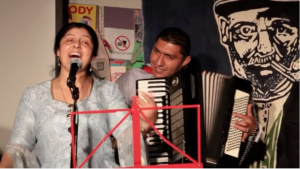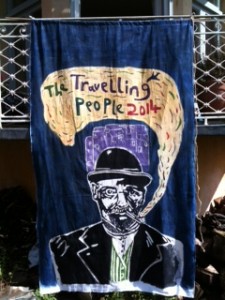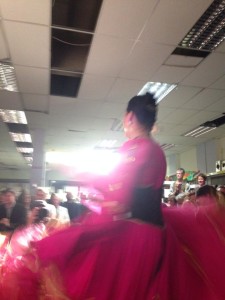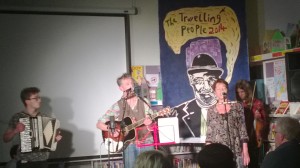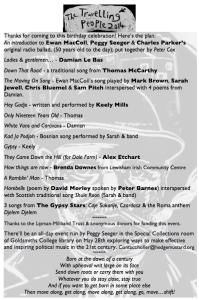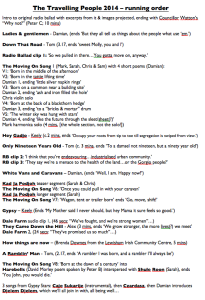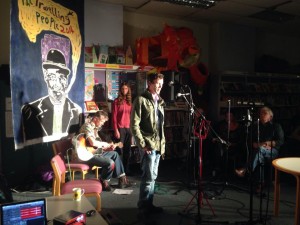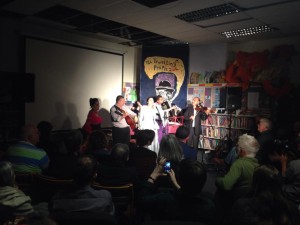It was back in the spring of 2013 that I was sitting in the Special Collections room in Goldsmiths College library, immersed in what was once the library of Peggy Seeger and Ewan MacColl, and discovered that their brilliant and still-resonant radio ballad The Travelling People was broadcaston April 17th 1964. Since that made it 10 days younger than me, it didn’t take too much calculation to work it would be 50 the following year…
So I carried on focusing on a workshop I was preparing, using the Seeger/MacColl material to celebrate the power of music as a positive political force for an event called Call & Response which marked the end of our two years as students on Goldsmiths’ fantastic community music course. That workshop involved shepherding people over to the library, guitar in hand, asking people to read out texts or lyrics from books in the collection, then playing related songs. As well as paying tribute to folk music’s ability to speak of everyday lives and extraordinary struggles, we doffed a collective cap to the potency of libraries themselves, both as places of learning, but also of connectedness.
Meanwhile, that anniversary had lodged in my head, so I dreamt up an elaborate plan as one of my college assignments to mark it with workshops with primary school children and refugees from around Lewisham, exhibitions and a big concert down the road at The Albany. Since I knew so little about Travellers, I thought at that point that an exploration and celebration of migration to the area might be the best option.
Fortunately, when I came back to the idea a few months later, it seemed foolish to shift away from the focus of the original programme, even if that involved me straying further from my comfort zone and immersing myself in Gypsy, Roma and Traveller cultures, all of which I knew next to nothing about. I was reminded of that some time later when I was asked by someone from Friends & Families of Travellers to give all those groups capital letters, as the original invitation referred to ‘gypsy, Roma & traveller’ communities. While that was temporarily embarrassing, I felt that my approach of contacting groups and individuals and saying upfront that I was on a steep learning curve (i.e. I was embarrassingly ignorant) was for the best. I just had to hope that people would respond positively to my desire to listen, learn and show some solidarity, and that’s how it seemed to turn out, praise be.
In another compartment of my life I’m involved with campaigns to dismantle the oil industry (no small task, then!) That often involves using art and music as a tool to challenge oil industry sponsorship of art and culture, as well as acting together with affected communities who are resisting Big Oil. It strikes me that helping to create space where representatives from those communities have a voice, particularly when they come over to London to speak truth to power, was excellent training for this project. In researching The Travelling People 2014 (as it came to be know), it was crystal clear that there’s a powerful and unsurprising desire not to be represented or interpreted, but rather to speak for oneself. That sense underpinned plans for a really good birthday party that would I hoped bring the haunting quality of the original radio ballad to a new audience, while also discovering what had changed over the years for the various Gypsy, Roma and Traveller communities from poetic voices within them.
It didn’t take long to realise that there were distinct differences – some subtle, some very clear – for example between Irish Travellers and English Romanies, and again within those groups. I was helped by Katherine Quarmby’s terrific book No Place To Call Home, which used the story of Dale Farm as a foundation to delve deep into the history of Gypsies, Roma & Travellers in these islands, revealing to me a shocking degree of brutal and systematic repression, not to mention incredible reslience. Of course, that repression is alive and well now in the UK, though probably more palpable and violently in eastern Europe, where Roma people are being subjected to appalling attacks and legislation. That was probably the strongest motivation I felt for there to be European Roma music as part of The Travelling People 2014, apart from the fact that their music is so often such a whirl of pleasure. Garth Cartwright’s Princes Amongst Men brought that home to me in no uncertain terms, and made me sad that I didn’t quite have the nerve to walk up to those incredible brass players busking on the South Bank in London and offer them a gig. But we did have The Gypsy Stars, so that was a fine consolation.
In a similar way, I didn’t have the nerve to do what Sam Lee did, which was to walk into Traveller sites in search of songs, especially songs that remained somehow uncollected. He was a real help in the serendipitous, circuitous journey towards having the right bill for the night, (and it was good to see him there as well). I listened to all the extraordinary singers on the Song Collectors Collective site, but it was Thomas McCarthy that Sam recommended, and he was right to, because his voice has an ache and a melancholy lift that is somehow a great respite from one’s own cares. And he is an Irish Traveller now settled in London who sings the music of his ancestors, including ‘Down That Road’, which was written by his grandfather, which kicked off his first album Round Top Wagon as well as our own show.
Separate conversations and investigations led me to the wonderful Keely Mills, and from her to Damian Le Bas, both fine writers with gypsy heritage who celebrate their roots without idealising it. I first saw Keely when we were both performing as part of Robin Grey’s Three Acres and a Cow: A History of Land Rights and Protest in Story and Song at Grow Heathrow. In a way that show has a similar remit in that it’s determined to reveal huge and inspiring chunks of ‘the people’s history’. She had already put me in touch with Damian, while underplaying her own talents, but when I discovered them, I immediately asked her to head down from Peterborough for The Travelling People 2014, where her poems injected a shot of anger and idealism into the show’s bloodstream.
Damian Le Bas is an interesting man: he’s editor of Travellers’ Times, which celebrates the culture(s), but also a writer who, in part, explores it without shying away from being critical if he feels the need. The pieces he wrote for the show were very strong, sometimes probing scabrously the multifarious prejudices he has catalogued, and sometimes speaking more lyrically of characters rueing times past.
He was a real support and sounding board for me as I put things together, for example when I wanted to know if Alex Goodman’s poster fit the bill. (That was an interesting process, and I probably drove Alex half crazy with my doubts and late suggestions. Maybe the fact that she has gypsy heritage herself gave her more patience – it certainly wasn’t the minimal fee! We toyed with an image that showed a journey out of the woods and off the road into the city, but it was the face of travelling showman Tommy Bugg that seemed to haunt us. At one point I rather fatuously suggested not entirely seriously that he have a smart phone, to emphasise the passage of time. In the end the only nod to that idea was the presence of the plane in the sky, though it might have been more accurate to have infested the sky with them…but let’s not get sidetracked by the perils of aviation expansion. Suffice to say that the power of the poster, be it on the ubiquitous Facebook event, or blown up beautifully to A3 and stuck on the windows of New Cross Learning, did a great deal to give people the sense that something compelling was set to happen on April 17th 2014.)
There were two very esteemed guests at that workshop in Goldsmiths’ Special Collections room: Gill and Kathy, the twin pillars of New Cross Learning, the local library that was reopened by the people in – I think – 2011. It’s a great place, packed with books, but also a hub for community events, and a real living testament to the power of the library to be a force for good. A little while after the workshop, Gill, Kathy and I sat down with the inspiringly enthusiastic and helpful Lesley Ruthven from Special Collections, and decided that she would put together a display from the Seeger MacColl collection to accompany the event at New Cross Learning. It felt great to be part of a project that was uniting these two very different but nonetheless tremendous spaces.
One of my initial motivations for this project was to take a leaf out of Ewan MacColl and Peggy Seeger’s book of songwriting tips, which was that the best way to write a song about a person or a world you know nothing about is to speak directly to him, her or them, and allow their words to become the song. That’s what they did, helping to amass at least 300 hours of interviews for the radio ballad, then hunkering down to write songs that were shot through with the experiences of those lives. I ended up taking ‘The Moving On Song’, which helps to bind the radio ballad together, and letting it do the same with our show, but this time interspersed with original material, particularly a series of short monologues written especially by Damian. I did write a new last verse for the song:
‘Born at the dawn of a century
With upheaval writ large on its face
Send down roots or carry them with you
Whatever you do stay close, stay true
And if you want to get born in some place else
Then move along, get along, move along, get along, go, move…’
I do wish I’d come up with something new using 21st century words, but maybe using the original song while placing new spoken word material within it could be seen as allowing people to mull on the nature of what has changed and what’s still the same, 50 years on, for good or ill. It’s hard for me to tell…
With an extremely long lead up from the time of deciding to organise something to the birthday itself, it was still somehow easy to let time slip away somewhat. Or perhaps that length of time contributed to that. Either way, spring looked to be on the way, and many things still needed sorting. Looking back, everything happened pretty much right on time, but in the moment, I was assailed by anxiety. From one perspective, that anxiety was a motor that ensured that calls were made, negotiations carried out etc., but I’ve also asked myself if that anxiety can suppress creativity, that part of oneself that does the ‘blue sky’ thing, allowing inspiration to strike. This was maybe a sacrifice that had to be made since I was playing so many roles, from the most administrative to the creative and purely musical stuff.
Once I had found the right performers and the poster was doing the rounds, I started working with musicians. Part of me had considered working up a more 21st century version of ‘The Moving On Song’, but that did feel a little self-conscious, and the original arrangement is so beguiling, that we stayed relatively faithful to it. At Grow Heathrow’s 4th birthday party, a fellow called Sam was coaxing tasty sounds from an accordion as part of our scratch band for the day, and later he made a brilliant, fiery speech about the positive effects of squatting, and the need to keep doing it, even in the face of tough new legislation. So he seemed to be perfect for the band, and was up for it, another bonus being his habit of bringing foraged wild garlic or lemon verbena to rehearsals. Old friend and musical cohort Chris Bluemel came in on violin, which is always a treat to hear, and the final component was Sarah Jewell on vocals.
Sarah’s always a source of suggestions that are musically compelling while deepening the thematic ideas. It was her idea to leap over to Bosnia during ‘The Moving On Song’ by singing ‘Kad Ja Podjoh’, a neat prefiguring of The Gypsy Stars shortly after. And when I was keen to bring in ‘Harebells’, one of a sequence of poems by David Morley which dramatise beautifully the relationship between the poet John Clare and his gypsy friend Wisdom Smith, she suggested it be spoken over a backing of a Scots tune called ‘Shule Roon’. Actor and fellow Songlines Choir member Peter Barnes stepped in late on take the reciting of the poem from my shoulders, which he did with gravitas and warmth, leaving me to concentrate on playing the chords in the right order on the guitar.
Harebells
John Clare puts down his violin. ‘Is there quickening wisdom
in the road and heath that sits hushed in a home and family?
I mean the music of life moving. Swallows, swans, fieldfares.
These are nearer to me, more so because they never stay.’
Wisdom Smith tugs corks on two bottles. He pulls a long face.
‘John, I know of no man more half-in or half-out of your race.
You covet our roving – you are no bad scraper at the fiddle –
But you will never join us because you love’ – gestures Wisdom –
‘you love all this. We are like the harebells around us, brother:
everywhere and unseen; clear-eyed as those night-blue bells;
rebounding from the trudge and trample of night and day;
onstaring weather; blooming on into the first autumn gales.’
The dusk wind blows out the lamps of all the heath’s flowers.
‘We die if we do not move, whereas John – John, you would die.’
Right from the start, there was one blessing that I had needed: that of Peggy Seeger. It had been a real pleasure to delve into back catalogue of her work with Ewan MacColl, as well as her solo albums. As a duo, they were known for spearheading a politicised folk music revival in the UK in the 1950s and 60s, but few seem to observe that their music is often exquisitely fleet of foot, and sometimes experimental.
Having not been able to make contact from a distance, I found out that she was to be guest tutor on the Baring-Gould Song School in October 2013, so I snapped up a place and so was lucky enough to be able to hear many a pearl of her wisdom during the week. She was really helpful in clarifying what I was trying to say in one of my own songs, which imagined the words of an asylum seeker about to be deported, rather than seeking them out directly. And she offered some invaluable insights into a song I was trying to write during the week. While she wasn’t able to make it to The Travelling People 2014, she did give it her blessing, as well as agreeing to run a day-long talk/workshop on effective political songwriting in the Special Collections room on May 28th 2014.
On the money front, I was lucky enough to receive £500 from the Lipman-Miliband Trust, not so lucky with the Arts Council, but then very happily an anonymous friend stepped in and covered the shortfall. All the performers, film-makers, designers, and banner-makers were paid a subsistence-level fee (although two waived theirs), and the library got £50. I suppose we could have charged a tenner a ticket, but New Cross Learning likes to run free events, and we got a fair amount from passing the hat round on the night.
Speaking of the night…well, for me it was mostly a blur of activity, but many people said that it really worked for them, that it really moved them, which is so gratifying. Keely said that is was one of the best organised events she’d been a part of, which made me laugh since the musicians only managed to soundcheck when most of the audience was in its seats, and I lost the programmes half an hour before showtime, (only to have them returned to me just as I was leaving the library:)
But I imagine she was referring to the running order:
The library has a lovely vibe, but some of the building could do with tarting up – funders take note! – and that was partly why I had somewhat opportunistically asked the amazing Marian at very short notice to make the backdrop, a colour version of the poster image, with Tommy Bugg now sporting a very natty green waistcoat. He had a very circuitous adventure before finally arriving at the library on the day of the show, as Marian and I had failed to connect on the platform at Paddington station for a handover. Then she fell asleep on a late train to Bristol and had to spend most of the following day trying to track it down, and oh so nearly had to give up hope of being reunited with it until a saintly rail employee called Nigel Organ actually went from Bristol to Newport to retrieve it. This tale caught the ear of radio producer Sara Parker, who also happens to be Charles Parker’s daughter and was present on the night. She’s one of the key people behind the Charles Parker Archive, along with Peter Cox and others, who put on a fascinating day digging into the making of the programme with the aid of Peggy Seeger, as well as a look at the changes in the intervening 50 years on April 4th up in Birmingham. When I took on this birthday do, I had no idea the Archive had been steadlily celebrating the 50th birthday of the various radio ballads since 2009(?)
I had decided early on to try not to have any authoritative figure explain the background or introduce the performers, and that the best way would be for each voice to emerge straight after the previous, with perhaps a verse of ‘The Moving On Song’, or audio from the radio ballad to bridge the gap and deepen the impact. So Peter Cox’ ‘10 minute précis of an hour long programme’ as he described it, alluding to the challenge he faced, wasn’t accompanied by his own voice, allowing words and images to speak for themselves. (By the way, Peter’s book Set Into Song is a terrifically compelling and authoritative history of the radio ballads.)
Before and after Alex Etchart’s stirring a cappella rendition of his ‘They Came Down The Hill (For Dale Farm)’, I included women’s voices from Dale Farm. In retrospect, I think there could have been more contemporary audio, but ne’er thee mind. I was worried that Brenda Downes’ section might be a clash, since she wasn’t performing a poem or song, but even though she was speaking prosaically, there was such anger and humour in what she said, that it seemed to merge with what came before and after perfectly.
Thomas McCarthy seemed to bewitch the audience (and us), singing of another world, one that has probably gone. His second song, ‘Only Nineteen Years Old’, was a blast of light relief, being the cautionary tale of a man who marries a nineteen year old lass who turns out to be ninety, even though there’s satire and sadness bedded into the lyrics.
The Gypsy Stars then swept onto the stage to perform three songs, culminating in the Roma anthem ‘Djelem, Djelem’, accompanied by their own dancer. Earlier I had had visions of all the performers joining in on this song, which Damian grew up hearing without ever quite latching onto the dark words, which reflect Roma experience during the Holocaust, but which are obscured, or maybe just perfectly balanced, by the merriment in the melody.
When they were done, I felt the need to compensate for not having had the programmes distributed by introducing and thanking all the performers and others who’d helped out. Actually it felt good to let the audience show its appreciation in that way to the people they had seen passing coming onstage unannounced and departing unapplauded.
My sense now of what we did is a combination of pride and disappointment. When I saw Keely’s blog http://keelymills.wordpress.com/2014/04/18/i-loved-travelling-with-these-people/, and read Damian’s words ‘I can’t stop thinking about the show… It’s opened up so many pathways and visions. Such a special night’ I feel a good glow. In a way, this was like a dress rehearsal in public, which is maybe OK since a version of it will be part of the next Songlines show on July 12th.
I’m so grateful to the makers of The Travelling People radio ballad for guiding me towards such rich seams of culture, character, resilience and resistance to concerted state repression. And I’m grateful to have met and worked with such delightful people along the way…

